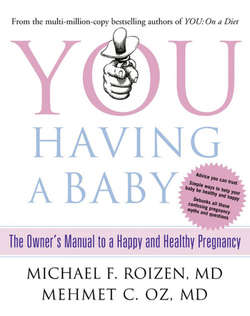Читать книгу You: Having a Baby: The Owner’s Manual to a Happy and Healthy Pregnancy - Michael Roizen F. - Страница 62
The Thyroid Puzzle
ОглавлениеMany women already know all about thyroid hormone problems; too much or too little can slow down or speed up metabolism and cause a host of symptoms that can make you feel out of sorts in an all-around kind of way. When you add pregnancy to the mix, thyroid issues can get even more complex.
Typically, a mother’s level of thyroid hormone increases between 10 percent and 30 percent during pregnancy, most likely due to the increase in estrogen. Extra estrogen during pregnancy stimulates your cells to make more proteins with binding sites for thyroid hormone. To fill those binding sites, you make more thyroid hormone, but the amount free in your bloodstream, which stimulates your cells, should remain normal, as the increase in production should balance the increase in binding sites. Sometimes, however, the adjustment is imperfect, and you end up with too much (hyperthyroidism) or too little (hypothyroidism) circulating thyroid hormone, which can cause you to experience metabolic chaos. Thyroid conditions are difficult to diagnose because they share some of the same classic symptoms associated with the hormonal changes in pregnancy, such as frenetic or low energy, excess weight loss or gain, and emotional fluctuations. In addition, hyperthyroidism can occur during pregnancy because two of the hormones produced by the placenta—hCG and hPL—mimic thyroid-stimulating hormone (TSH), which does exactly what its name implies—stimulates the thyroid to produce thyroid hormone.
It’d be nice if you could just pop thyroid medication to handle these problems, but it’s not so easy. Because tests used to determine levels of thyroid-stimulating hormone in your blood often cannot distinguish among TSH, hCG, and hPL, it’s hard to be sure that the thyroid is causing your symptoms and, if it is, to determine the optimal dose of medication.
In pregnancy, women who start out with hypothyroidism typically need to increase their thyroid hormone dosage by 50 percent because the increased estrogen produces an increased level of a protein that binds thyroid hormone, meaning even less thyroid hormone is available for the mother.
Another interesting note: There are talks about requiring a thyroid test for pregnant moms because there seems to be a strong link between undiagnosed hypothyroidism during pregnancy and reduced IQ in their offspring.
